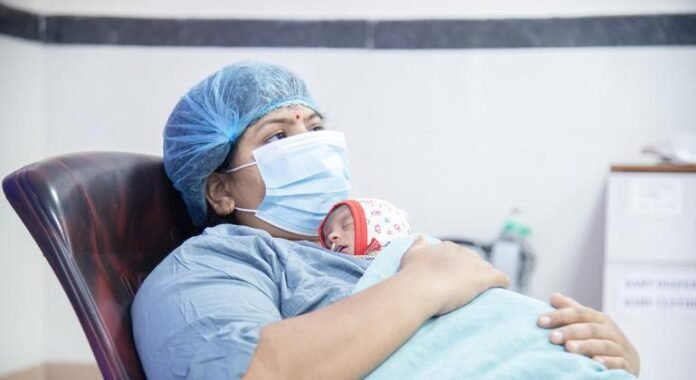Lalita Bai’s heart was beating fast with anxiety as she walked through the corridors of the hospital. Lalita’s newborn baby was admitted to the Special Newborn Care Unit (SNCU) of a government hospital in Madhya Pradesh’s Guna district for the past 12 days.
Amidst the low hum of machines and the care of nurses, their newborn baby was fighting for life. Lalita stood by her child every day, touching his tiny hands and forehead and whispering loving words in his ear.
When Lalitha reached the incubator today, she felt something different. There was silence in the room, as if they were waiting there.
Lalita touched her little child’s hand with trembling fingers. Their joy knew no bounds when at their touch their baby opened his eyes and his hands also started moving.
This newborn baby opened his eyes for the first time 12 days after birth. Lalita becomes emotional and tears of joy flow from her eyes.
She was surprised to see her child’s hand moving – a small but powerful sign of hope for life.
This small gesture seemed to promise better days ahead. Leaning close to the child, he whispered fondly, “My child.”
In such cases, Lalita is not a single mother. Mamta and Bivod’s younger daughter too due to premature delivery SNCU is admitted.
After 16 days in the special neonatal care unit, the baby was sent to the ward. Bivod said, this is our first child. We were not confident that it would survive. But due to the dedication and cooperation of the doctors and nurses, today we are returning home with our daughter.”
A beacon of hope for parents
Today, Special Neonatal Care Units (SNCUs) across the country are engaged in efforts to save the lives of thousands of newborns. It started with small steps taken in 2003 in Purulia district of West Bengal.
To reduce the neonatal mortality rate in India, the first 12-bed geriatric and neonatal care unit was established here.
The initiative was launched in partnership with UNICEF, research organization Society for Applied Studies, Kolkata (SASK) and District Health and Family Welfare Committee and Purulia Zilla Parishad.
“This pilot project has resulted in a significant reduction in neonatal mortality in SNCU facilities, which has had a direct impact on the overall neonatal mortality rate,” said Vivek Birendra Singh, UNICEF health specialist in India.
“This initiative shows that it is possible to provide state-of-the-art services for sick newborns in government hospitals, even at the district level.”
Madhya Pradesh has set a precedent
Dr. Himani Yadav, Deputy Director, National Health Mission, Child Health, Government of Madhya Pradesh, said, “Madhya Pradesh, being a vast geographical area, faces numerous challenges in addressing neonatal mortality.”
“The government, in collaboration with UNICEF, established the state’s first SNC unit in Guna district in 2007, followed by another unit in Shivpuri.”
SNC units are equipped with necessary equipment and trained paediatricians and nurses as well as other support staff.
It has helped provide a modern facility in rural areas, which is proving highly effective in saving the lives of the smallest and weakest newborns.
As soon as these units start functioning, their impact on the common man and the infant mortality rate is clearly visible. Through this, the modern facilities of newborn care are reaching the villages.

Dr. Himani said, “The success of the model has encouraged the government to start SNCU projects from Himachal Pradesh to Tamil Nadu and other states. Today, 1054 SNCUs are functioning smoothly across the country, saving the lives of thousands of newborns every year.”
“This small model that started in Madhya Pradesh has emerged as a nationwide project.”
Partha Sarthi Sen Sharma, Principal Secretary, Department of Medical, Health and Family Welfare, Government of Uttar Pradesh said, “UNICEF has given full support to this. “With the support of UNICEF and NHM, we were able to integrate CPAP operations into the SNCU.”
Today, 1054 Special Neonatal Care Units (SNCUs) established across the country have become a beacon of hope for countless families by saving the lives of newborn babies.
As Malti Mayurya, who lives in a town in Uttar Pradesh, says, “My child had a heart problem from birth and was underweight. At birth he did not think he would survive. But today he is with us.”
Malati’s eyes filled with gratitude.

A collective effort to save lives
Dr PN Verma, in-charge of SNCU, who has been a part of the project since its inception, tells the story of its incredible progress, “We now save more than 300 newborn lives every month. This is four times more than our initial numbers. In 2007.”
Their team not only treats children during their admission, but also prepares families for future child care. They make sure that the children grow up well at home as well.
Dr. Himani Yadav explains the human connection between parents and doctors, “Our work starts as soon as the newborn is admitted to the SNCU and continues till the baby makes a full recovery.”
“We explain the responsibility of all family members, including the father, to take care of the child, because the child is the responsibility of the entire family, not just the parents.
After discharge from the hospital, the child is under the watchful care of “Asha Didi” (ie a recognized social health worker – Asha).
‘Asha Didi’ helps parents to do regular check-ups at specified intervals. Free ambulance service provided to take parents from home to hospital.
Asha Didi’s help is invaluable for new parents like Bivod. Bivod proudly says, “My wife and I learned from Asha Didi how to take care of our children. “We can take help from them anytime in an emergency.”

